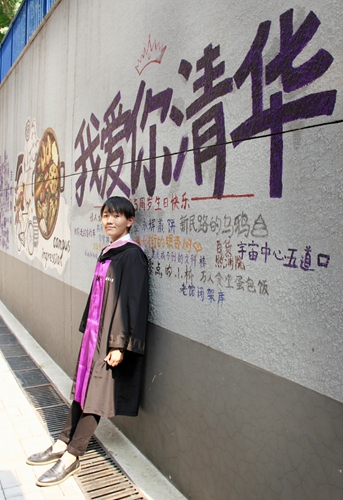ARTS / BOOKS
Young Japanese man shows the real China to Japan in his new book

Hideo Natsume Photo: Courtesy of Hideo Natsume

The Japanese book Contemporary China through the Eyes of Japanese Youth: Technology, Education and Culture Photo: Courtesy of Hideo Natsume
Digital wallets, bike-sharing, online shopping… The highly developed digital industry in China has left a deep impression on 26-year-old Japanese man Hideo Natsume, who decided to write a book to share his 19-year experience of living in China with the people of his motherland, which is full of one-sided negative news about its neighboring country.
"I was born in Japan and grew up in China. For me, Japan is my mother country and China is my hometown. I want to try my best to sow the seeds for cultural exchanges between China and Japan," Natsume told the Global Times.
Stuck in time
Born in Tokyo, Japan in 1995, Natsume moved to Beijing with his parents at the age of 5. He once planned to go to the UK for his further education after graduating from high school. But after seeing the infinite possibilities from China's huge market and opportunities, he chose to stay in China. And after he got his master's degree at prestigious Tsinghua University in 2019, he went back to Japan to work.
However, after returning to Japan, he found many Japanese knew little about China, the eastern country with 5,000 years of history. Meanwhile, most news about China reported by the Japanese media was negative while the news about China's rapid development was almost zero.
"The 'cashless payments' that Japan is promoting was popularized in China a few years ago, but many Japanese take it for granted that nothing has changed in China. In fact, it is Japan that hasn't changed much in decades," said Natsume.
He recalled that when his Japanese friends came to China to travel, they were shocked when saw that people were not taking cash out to shop but were using their phones instead and the bike-sharing as well as the advanced food delivery services. These totally changed their previous impression of China.
"Many Chinese 'fall in love' with Japan when they go for a visit, and many of them like Japanese ACGN culture. But on the contrary, how many Japanese know about the real China? Japan needs to change its view of China. It is very necessary," said Natsume.
Driven by this sense of urgency, Natsume decided to write some articles in Japan's financial newspaper The Nikkei, and introduced many interesting topics including a Chinese company for unicorns and China's internet influencer economy.
Then he published the Japanese book Contemporary China through the Eyes of Japanese Youth: Technology, Education and Culture in 2020.
The book's Chinese version was published in China in October.
He said he hopes his book can provide Japanese readers with a look at the real China.
In fact, in Japan where right-wing groups are growing in power, "anti-China" books are very popular, but books about "introducing China" have to be tested by the market, and also are more likely to suffer attacks from the right wing.
"It does take courage to publish books in Japan to reverse the impression of China," Natsume said, but fortunately, he hasn't received any verbal attacks from right-wing groups after publishing this book.
Cultural communication
After publication, the book quickly squeezed into the bestseller list in Japan, and has succeeded in reversing some Japanese people's negative impressions of China. Some book reviews even called it "a must-read book for Japanese people."
According to the Amazon Japan website, many readers wrote in reviews of the book that "we seem only to care about the negative side of China, but in fact, we have a lot to learn from the country."
"There is a huge difference between the China reported by the Japanese media and the China described by the author who has a rich personal living experience. If this continues, Japan will eventually be eliminated by the world, and this book is sounding the alarm for this," one reader commented on Amazon Japan.
Another reader recalled his short-term study in China a decade ago. He noted that Chinese people have a strong sense of competition and the students studied hard.
At that time, the pocket money brought by one Japanese student to China could be equivalent to the annual salary of a Chinese in the working class. But in just 10 years, such drastic changes in China are "beyond his imagination."
Natsume said that "limited information" might be the main reason that Japanese society has such a big prejudice against China.
"Though we are in a world full of 'information,' if we don't take the initiative to search, we will be controlled by a single source. One of the purposes of writing this book is to open a window for the Japanese to understand China's current society, and to convey the true information of China to the Japanese people," he said.
"Japanese, especially us young people, need to learn from the advanced experience of China. We have the responsibility to convey a real China to Japan," he said and noted that he published the Chinese version of the book in the hopes that Chinese readers can better understand their home country through the perspective of a Japanese youth.




